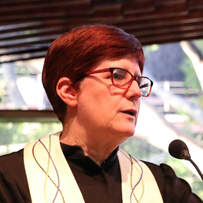 By Rev. Kathleen Owens, LeadMinister Unitarian Universalism is a covenantal faith. This means we don't follow a fixed creed handed down from a religious authority; we create a covenant for how we want to be in relationship with each other in this faith community. In 2008, this congregation created a church-wide covenant. As I mentioned in my May 23, 2021 "Real Community: Messy, Imperfect and Needed," this covenant hangs in every room at both our Hillcrest and South Bay campuses. It's also on our website - under the About menu tab, click on Governance; under Guidelines, you?ll find our Covenant of Good Relations.
0 Comments
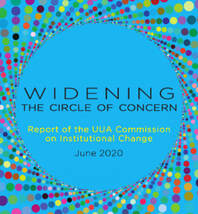 September's worship theme at our church was Change and the Unitarian Universalist Association's (UUA) Commission on Institutional Change report is an important reflection on various changes that must be made, if the UUA is going to live its values into practice. At the June 2017 General Assembly (GA), after the resignation of then UUA President Peter Morales and due to the entrenched hiring practices and harm created by the UUA, a Commission on Institutional Change was "established and charged by the UUA Board of Trustees to conduct an audit of white privilege and the structure of power within Unitarian Universalism, and to analyze structural racism and white supremacy culture within the UUA." The Commission worked for three years interviewing and listening to people's experiences within the UUA examining the current practices that have maintained the status quo. At the General Assembly in June of this year, the Commission presented its report, Widening the Circle of Concern: Report of the UUA Commission on Institutional Change. 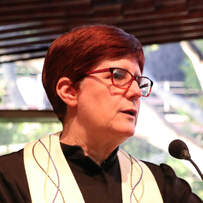 The fall is a favorite season of mine. I enjoy the changes fall brings: cooler weather, the turning of leaves, and the food of the season. This month will also bring the opportunity to practice living our values and principles, to learn about ballot initiatives and engage deeply in important questions about who we want to be and what direction we want our country to move in as we approach the November election. Our monthly worship theme of Reparations is timely. This topic is both straight forward and complex. This topic brings up all kinds of emotions and there's a lot to learn together. For me, one of the biggest values tied to the theme of Reparations is truth-telling- recognizing the fuller story of our country's history and how it continues to play out in our lives today. This theme asks us important questions that affect our future. I recommend this article for you to read: Floyd’s America — Introduction: The Post-Slavery State, Homicide, and the New Case for Reparations.  By Martin Kruming On a warm, sunny day in March, San Diegans went to the polls. After showing identification, they received their ballots, stepped into voting booths, made their choices, handed the ballots to poll workers, and hurried off to work, home, or elsewhere. Thousands of miles away, citizens of Azerbaijan, a former Soviet Republic surrounded by Russia, Iran and Turkey, showed up at polling stations on a cold, blustery day in February to choose members of the Azerbaijan Parliament. They showed IDs, took a ballot which they marked, returned it to the election officials, and stuck around to socialize with fellow voters. Two places-16 hours apart by plane-each trying to make democracy work during a very unsettling and confusing period in history. 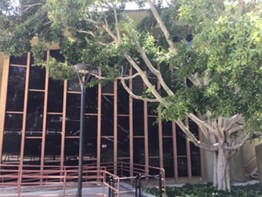 By Tony Brumfield I want to begin my reflection on resilience by talking about the tree outside our window. That tree needs certain things to withstand difficult times. For one, it needs to be firmly rooted. The Earth not only holds it in place but provides nutrients. The tree needs water. When a tree doesn't get enough water, or the quality of its water is poor, the tree becomes vulnerable to disease. Trees also need air. Trees breathe. Trees need sunlight. Sunlight, water, and air are needed for trees to generate food. The temperature of the air can neither be too hot nor too cold. But trees need more than physical things. Trees thrive best in a forest. I must say that we human beings need the trees in our lives. Not just the trees but all the other living things in our world. And they need us. The resilience of this world very much relies on us human beings being responsible, not just for us, but for all of life. 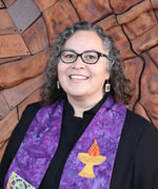 By Rev. Tanía Márquez, Assistant Minister When I was 14 years old, while visiting my family's town in Southern Mexico, a group of friends invited me to climb to the church's bell tower from where we could see the procession of people coming into the town to celebrate its annual festival. To get to the bell tower, we had to go through a dark and narrow spiral staircase. While looking forward to the view from the town's highest building, the time we spent in the staircase seemed endless. I was afraid, mostly because it was hard to see beyond the step I was about to take, and it was the voices of the people I couldn't see, but who were there with me, that encouraged me to keep going. 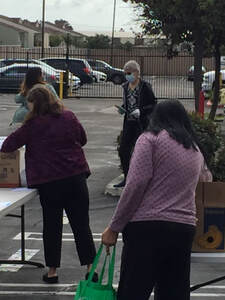 Sonya Prestman counts food pantry shoppers. Sonya Prestman counts food pantry shoppers. By Maureen McNair In June of 2019, four or five congregants attending the annual meeting in the Meeting House wrote down that their vision for the future of First UU included a food pantry or a soup kitchen. At the time, the primary concerns on the minds of most people at that meeting were things such as how we would respond to the offer from UCSD Medical Center to purchase our Hillcrest campus; whether we would expand our music, dance, and art programs; and, requests that we find more ways to enjoy meals together. I didn't believe those few requests to start a food pantry would make it into the top five goals of the new strategic plan the congregation was providing input for. But, those requests reflected such an acute and immediate need that, as a newly elected member of the Board of Trustees, I thought we should do something about them. 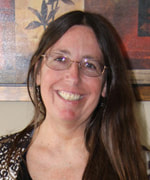 By Kathleen Swift, Family and Lifespan Ministry Director Like most of us, your fears and anxieties over the coronavirus COVID-19 are probably elevated right now. Although the risk for children and young adults appears to be less than for older adults, news of this pandemic is changing daily and is alarming. Many parents are wondering how to talk about it with their children in away that is reassuring, but factual. According to experts at the Child Mind Institute, it's better to talk about it than avoid the subject. Your children have probably already seen people wearing masks and have heard stories from their friends. Not talking about it can make kids worry more.  Len and I spent six weeks trying to escape winter weather, on the Sea of Cortez, near Guaymas, Sonora, where it was a bit warmer than here on the Pacific Ocean. We rented a beautiful hacienda style house, steps from the shore. We settled in and adopted a daily routine: sleeping until the sun woke us, Len feeding and walking the dog while I cooked breakfast, enjoying the sun's warmth while eating breakfast on the patio, watching the fishermen, a diver, brown pelicans, seagulls and an occasional bottlenose dolphin begin their daily routine right in front of us. Getting acquainted with a new kitchen is always a bit challenging, but, after a few days, I could fix breakfast without too much difficulty. Until one morning when I lost the can of Pam Cooking Spray. |
What's New?The First UU Church of San Diego blog is your resource for upcoming events and past event recaps. Leave us a comment to let us know what you think!
Categories
All
Archives
July 2024
|
(619) 298-9978 | Staff Directory
Hillcrest campus 4190 Front Street, San Diego, CA. 92103 | South Bay campus 970 Broadway, Chula Vista, CA. 91911
For GPS to our Hillcrest Campus, please use 298 W Arbor Dr., San Diego, CA 92103
For directions, parking and more see our Contact page.
Hillcrest campus 4190 Front Street, San Diego, CA. 92103 | South Bay campus 970 Broadway, Chula Vista, CA. 91911
For GPS to our Hillcrest Campus, please use 298 W Arbor Dr., San Diego, CA 92103
For directions, parking and more see our Contact page.
©First Unitarian Universalist Church of San Diego. All rights reserved. Admin.

 RSS Feed
RSS Feed





